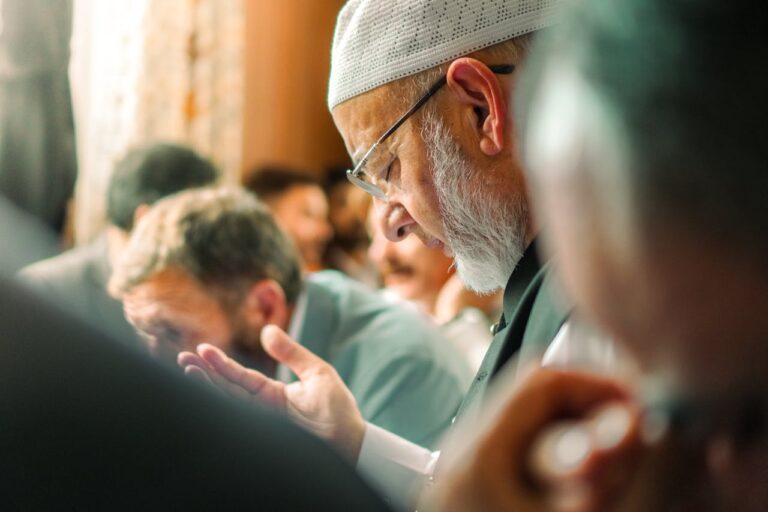A Step By Step Guide on How to Perform Ghusl
Ghusl, the ritual bath in Islam, holds profound significance for millions of Muslims around the world. But beyond its spiritual importance, performing ghusl can sometimes seem difficult for those unfamiliar with its intricacies. Whether you’re seeking to cleanse yourself after an unavoidable situation or preparing for Friday prayer, understanding how to perform ghusl correctly is essential.
In this comprehensive guide, we will describe the steps involved in this sacred act of worship. Join us as we navigate through not only how to perform ghusl but also why it’s an integral part of maintaining purification (taharat) and connection with Allah. By the end of this article, you’ll understand some important FAQs that people ask regarding ghusl in Islam.
How to Perform Ghusl: A Detailed Process
- Making the intention for purification.
- First, wash both hands up to the wrists three times.
- Perform istinja (cleaning after urination and defecation) and remove any impurities from the body.
- Perform ablution (wudu) as usual.
- Pour water over the entire body three times, starting from the head.
- Begin by pouring water on the head, then the right shoulder, followed by the left shoulder.
- Ensure water reaches every part of the body by pouring it over and rubbing it three times.
- Avoid talking during ghusl.
Essentials of Ghusl
To simplify and standardize the process, Islamic jurists have outlined three obligatory acts in ghusl steps:
- Rinsing the Mouth: This involves rinsing the mouth thoroughly, ensuring water reaches the throat. However, during fasting, take care to avoid swallowing water, as this would invalidate the fast.
- Sniffing Water into the Nostrils: This involves sniffing water into the nostrils until it reaches the soft bone.
- Ensuring Water Reaches the Entire Body: Water must flow over the entire body such that no part, even as small as a hair’s breadth, remains dry.
How to Perform Ghusl for Females
It is clarify that the three obligatory acts apply to both men and women. Therefore, the claim that women have a fourth obligation, such as wrapping a cloth around their fingers to clean their private parts, while performing ghusl after menses, is incorrect. However, women should ensure the external areas of their private body parts are washed since it is feasible to get water there without difficulty. This is similar to the explicit instructions given by Islamic jurists about ensuring water reaches areas like the navel and under rings.
When To Do Ghusl?
There are three classifications based on circumstances that require to do gusl. These instances highlight the importance of cleanliness and spiritual preparedness in various significant moments and events in a Muslim’s life.
Obligatory Gusl
The following are the cases in which taking a bath is obligatory. One is not allowed to perform any worship without performing the obligatory Ghusl. These are the 5 circumstances when Ghusl is obligatory.
- Ghusl after intercourse
- Experiencing a wet dream.
- Sexual intercourse between a man and a woman
- Ghusl after menstruation cycle completed
- End of postnatal bleeding (nifas)
Sunnah Gusl
In the following cases, bathing is Sunnah.
- For the Friday prayer. (Bukhari)
- For the Eid prayers. (Ibn Abi Shaeba-tul-Mussanif)
- When wearing the Ihram for Hajj or Umrah. (Tirmidhi)
- On the Day of Arafah. (Ibn Abi Shaeba-tul-musanif)
Mustahabb Gusl
It is recommended (not compulsory) to perform Ghusl in the following situations:
- When a person converts to Islam in a state of purity.
- When a child reaches the age of puberty.
- When a person recovers from insanity.
- After cupping (hijama) or bloodletting.
- After giving a ghusl to the deceased.
- For worship on the night of mid-Sha’ban.
- For special worship during Laylat al-Qadr.
- Before entering Mecca.
- Before entering Medina.
- For the stay at Muzdalifah during the days of sacrifice.
- For performing the Tawaf al-Ziyarah.
- For the prayer during a solar eclipse.
- For the Salat al-Istisqa (prayer for rain).
- During times of fear.
- During periods of intense darkness during the day.
Common Mistakes to Avoid During Gusl
- Before performing Ghusl, one should perform Istanja (even if no impurity is visible). If there is any impurity, such as semen or other impurities, it should be thoroughly cleansed from the body.
- One who is required to perform an obligatory ghusl should not delay it because angels of mercy do not enter a house where such a person is living.
- It is prohibited for a person in a state of ritual impurity to enter a mosque, perform circumambulation (tawaf), touch, or recite the Holy Qur’an.
- If a person to whom it is obligatory to do Ghusl, recites salutations upon the Prophet (Durood Shareef) or any other prayer, there is no harm, but it is better to do so after performing ablution (wudu) or rinsing the mouth. It is also permissible for him to respond to the call to prayer (adhan).
- In the absence of water for wudu or ghusl, one should perform dry ablution (tayammum).
FAQ
Does ghusl count as wudu?
In case of obligatory ghusl, ghusl will be count as wudu, but if it is sunnah or mustahabb ghusl, then ghusl is not treated as wudu.
Can you fast without ghusl?
It is better to perform the ghusl before the dawn (fajr) prayer so that the fast is free from impurity. However, if the bath is not taken, it does not harm the fast in any way.
Can you do ghusl with braids?
It is compulsory to untie a braids to perform ghusl if water is not reaching the tangled hair. This is similar to the explicit instructions given by Islamic jurists about ensuring water reaches areas like the navel and under rings.
Does precum require ghusl?
if it is certain that the fluid is precurm, pre edacutated or prostate fluids, then it is not required to perform gusl.
How to perform ghusl after period?
Women should perform ghusl after ending the menstural cycles as per the method outlined here.
Conclusion
In conclusion, performing ghusl is a significant practice in Islam that ensures spiritual purity and readiness for prayer. It is essential to learn how to perform ghusl. By following the outlined steps, misconceptions and frequently asked questions you can fulfill this important ritual with confidence and devotion. It’s essential to approach ghusl with mindfulness, as it reflects your commitment to maintaining a clean and pure state before engaging in acts of worship. Remember that consistency in these practices will enhance your spiritual journey and connection with Allah.








